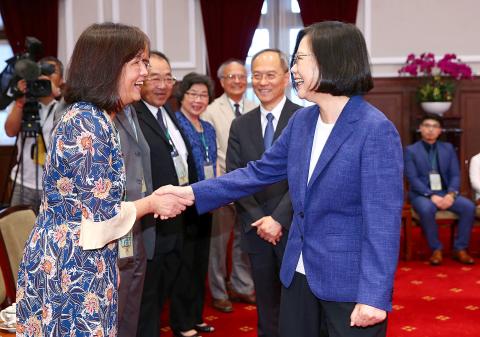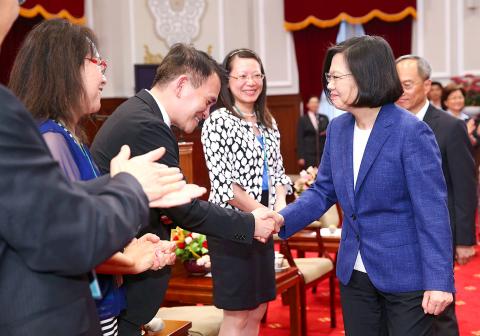President Tsai Ing-wen (蔡英文) yesterday urged the US to include Taiwan in an exemption list for its tariffs on steel and aluminum imports.
“A stable economic partnership between Taiwan and the US plays a positive role in Washington’s economic security,” Tsai said. “We hope the US will include Taiwan in the exemption list for tariffs imposed on steel and aluminum imports under Section 232 of the Trade Expansion Act of 1962.”
She made the remarks while meeting with a delegation from the US-China Economic and Security Review Commission at the Presidential Office Building in Taipei.

Photo: CNA
US President Donald Trump on March 8 signed an order to impose a 25 percent tariff on steel imports and a 10 percent tariff on aluminum imports.
The order includes a provision that nations seeking exemption from the tariffs are allowed to propose “satisfactory alternative means” to address trade inequities.
It was the first time in more than three decades that the US invoked the law to protect a domestic industry from the competition brought about by imports.

Photo: CNA
Despite talks with the US, Taiwan has not been added to the exemption list, but has vowed to obtain the status through continued negotiations.
During the meeting with the delegation, Tsai said that Taiwan would continue to engage in constructive dialogue with the US on a wide range of economic and trade issues, adding that she hoped the commission could help advance the two nations’ strategic economic partnership.
To strengthen ties with the US, Taiwan is to send a large delegation to Washington to participate in next month’s “SelectUSA” investment summit, which focuses on direct investments in the US, she said.
Tsai said she was delighted that 172 US representatives and 13 senators had written to the WHO to express their support for Taiwan’s participation in this year’s World Health Assembly, from which it has been excluded.
Taiwan had hoped to attend the meeting as an observer, as it did from 2009 to 2016, but did not receive an invitation because of Beijing’s opposition.
The US Congress in 2000 established the commission to monitor, investigate and submit an annual report to the legislature on the national security implications of the economic relationship between Washington and Beijing.
The delegation included commission vice chairwoman Carolyn Bartholomew and commissioners Roy Kamphausen, Jonathan Stivers, Katherine Tobin and Larry Wortzel, the Presidential Office said.

MAKING WAVES: China’s maritime militia could become a nontraditional threat in war, clogging up shipping lanes to prevent US or Japanese intervention, a report said About 1,900 Chinese ships flying flags of convenience and fishing vessels that participated in China’s military exercises around Taiwan last month and in January have been listed for monitoring, Coast Guard Administration (CGA) Deputy Director-General Hsieh Ching-chin (謝慶欽) said yesterday. Following amendments to the Commercial Port Act (商港法) and the Law of Ships (船舶法) last month, the CGA can designate possible berthing areas or deny ports of call for vessels suspected of loitering around areas where undersea cables can be accessed, Oceans Affairs Council Minister Kuan Bi-ling (管碧玲) said. The list of suspected ships, originally 300, had risen to about 1,900 as

Japan’s strategic alliance with the US would collapse if Tokyo were to turn away from a conflict in Taiwan, Japanese Prime Minister Sanae Takaichi said yesterday, but distanced herself from previous comments that suggested a possible military response in such an event. Takaichi expressed her latest views on a nationally broadcast TV program late on Monday, where an opposition party leader criticized her for igniting tensions with China with the earlier remarks. Ties between Japan and China have sunk to the worst level in years after Takaichi said in November that a hypothetical Chinese attack on Taiwan could bring about a Japanese

MORE RESPONSIBILITY: Draftees would be expected to fight alongside professional soldiers, likely requiring the transformation of some training brigades into combat units The armed forces are to start incorporating new conscripts into combined arms brigades this year to enhance combat readiness, the Executive Yuan’s latest policy report said. The new policy would affect Taiwanese men entering the military for their compulsory service, which was extended to one year under reforms by then-president Tsai Ing-wen (蔡英文) in 2022. The conscripts would be trained to operate machine guns, uncrewed aerial vehicles, anti-tank guided missile launchers and Stinger air defense systems, the report said, adding that the basic training would be lengthened to eight weeks. After basic training, conscripts would be sorted into infantry battalions that would take

DEEP-STRIKE CAPABILITY: The scenario simulated a PLA drill that turned into an assault on Taiwan’s critical infrastructure, with the launchers providing fire support Taiwan yesterday conducted this year’s first military exercises at Longsiang Base in Taichung, demonstrating the newly acquired High Mobility Artillery Rocket System’s (HIMARS) ability to provide fire support and deep-strike capabilities. The scenario simulated an attack on Penghu County, with HIMARS trucks immediately rolling into designated launch areas and firing barrages at the Wangan (望安) and Cimei (七美) islands, simulating the provision of fire support against invading forces. The HIMARS are supposed to “fire and leave,” which would significantly increase personnel and equipment survivability, a military official said. The drill simulated an exercise launched by the Chinese People’s Liberation Army (PLA) Eastern